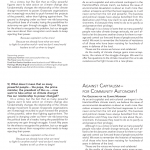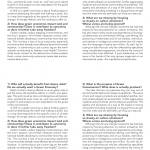
Page 1/2 of a printable version of the leaflet. It’s laid out to be half a letter-size sheet printed on both sides and folded in half.
Text from a leaflet distributed at the Hamilton2Paris Climate rally in Hamilton, Ontario. The H2P rally was organized by a coalition of local organizations who invited others to form their own contingents.
Against Capitalism — For Community Autonomy!
As an anti-capitalist and anti-colonial contingent in the Hamilton2Paris climate march, we believe the issue of environmental devastation is about so much more than carbon emissions and that the best responses to it will never come from the rich and powerful. The business and political classes have always benefited from this destruction and if they now claim to care about the environment, it’s because they need to do so to pacify us and preserve their privilege.
Although it is a victory of sorts that so many powerful people now take climate change seriously, we can’t afford to let this become another chance for them to manage and control our lives and those of people around the world. We want to remember the histories of resistance of all those who have been resisting for hundreds of years in defense of the land. These are the voices we honour and celebrate!
As the reality of climate change gains more acceptance, the nature of the struggle changes. We want to offer five questions to the climate movement for us to ask ourselves as the fight moves into a new phase.
1) Who will actually benefit from Green Jobs? Do we actually want a Green Economy?
Most of what is being offered to us as green jobs is just the same old exploitative labour in a fresh, eco-package. The work is just as toxic and dangerous and precarious – sometimes even more so – but now we’re asked to pitch in and accept our own exploitation for the good of the environment. A shift to a green economy is about finding ways to continue destroying the earth and making a profit, but in a way that responds to the specific crisis of climate change. It’s empty rhetoric and has nothing to offer us.
2) How does green economics impact land and communities? Does it contribute to autonomy or does it further take away freedom?
Carbon credits, carbon trapping, forest reserves, and the REDD+ project — all of these measures involve international bodies dictating to communities how they can live. This involves a loss of local autonomy, especially of communities already most affected by environmental injustice.. Is continuing to put a price tag on the earth actually contributing to freedom and health? Communities never consent to the destruction of what sustains them – more community autonomy means less environmental destruction.
3) What is the purpose of Green Consumerism? What does is actually produce?
The idea that we can passively buy our way out of environmental destruction keeps us apathetic. The wave of eco and organic products are probably healthier, but only certain people can access them, further aggravting injustices around whose communities are poisoned. The apathy and alienation of a way of life based on being consumers (including investing) is a big part how we got into this mess and we defintely can’t buy our way out.
4) What are we missing by focussing so closely on carbon emissions? Whose voices are being ignored?
Although the climate change movement has had real impact by focusing attention on carbon emissions, this has also meant many voices and experiences of ecological destruction are overlooked. Mining, over-fishing, the poisoning of waterways and of our bodies, extinction, and attacks on Indigenous communities don’t fit neatly into the language of parts per million. As well, by focusing on data that can only be collected by specialists using complicated equipment, we silence the voices of communities most affected. It puts leadership on the issue in the hands of the only groups organized on an international scale – the capitalists and politicians.
5) What does it mean that so many powerful people – the pope, the prime minister, the president of the USA – now want to take action on climate change? Has our relationship to power changed?
It’s a victory, but the fact that so many powerful figures want to take action on climate change also fundamentally changes the relationship of the climate change movement to power. Grassroots organizations are increasingly recruited to push forward the projects of the powerful, rather than fighting against them. The ground is changing under our feet – we risk becoming the political base of a leader, losing the possibilities for autonomy we gain through struggle. It took fifty years for the elites to recognize this problem, but our struggle was never about their recognition and needs to keep rejecting their power.
Because capitalism is the crisis!
Because we already have what we need to fight for another world– and we don’t need world leaders to tell us when to begin!
Supporting groups:
Sanctuary Hamilton: www.sanctuaryhamilton.org
The Tower: www.the-tower.ca
Food Not Bombs Hamilton: www.facebook.com/FNBHamilton
Flamingo Mutiny Brigades: www.facebook.com/flamingomutinybrigadeCC-flyer-Print-imp
